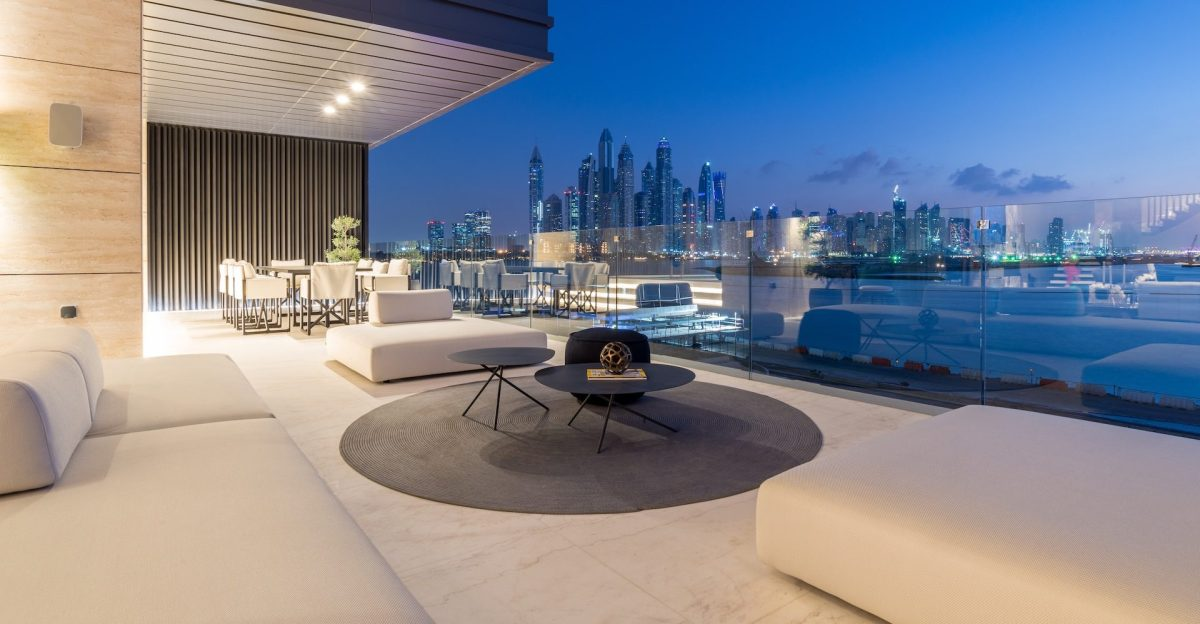Now Reading: Dubai Property Taxes Foreign Investors Should Know Before Buying
-
01
Dubai Property Taxes Foreign Investors Should Know Before Buying
Dubai Property Taxes Foreign Investors Should Know Before Buying

Table of Contents
Property Taxes: Dubai’s real estate market in 2025 remains a global investment hub, with 94,000 residential transactions worth AED 262.7 billion in H1, up 23.04% year-on-year. Foreign investors are drawn to freehold zones under Decree No. 3 of 2006, offering 6–12% rental yields, 5–15% capital appreciation, and a tax-friendly environment.
Unlike many countries with annual property taxes (1–3% in cities like London or New York), Dubai imposes no personal income tax, capital gains tax, or annual property tax on residential properties, making it highly attractive for Europeans, Americans, and Asians.
However, certain fees and indirect taxes apply, which foreign buyers must understand to budget effectively and maximize returns. This guide outlines key tax-related considerations for foreigners purchasing property in Dubai in 2025, ensuring compliance and financial clarity.
Key Taxes and Fees for Foreign Investors
Foreign investors enjoy the same tax benefits as UAE nationals in Dubai’s real estate market, but specific fees and indirect taxes arise during purchase, ownership, and rental. Below is a detailed breakdown based on 2025 regulations.
1. Dubai Land Department (DLD) Transfer Fee
- Description: A one-time fee of 4% of the property’s purchase price, payable to the DLD during ownership transfer. Typically split equally between buyer and seller, but buyers often cover the full amount (e.g., AED 80,000 for a AED 2 million property).
- Applicability: Applies to all property transactions, including off-plan and ready properties in freehold zones like Dubai Marina, JVC, or Downtown Dubai. Some developers waive this fee for off-plan purchases as an incentive.
- Compliance: Pay at a DLD office or Trustee Centre during title deed issuance. Verify via DLD portal to ensure accurate registration.
2. Registration and Administrative Fees
- Description: Fixed fees for registering the property with DLD. For properties over AED 500,000, the fee is AED 4,200; under AED 500,000, it’s AED 2,100. An additional knowledge fee (AED 540) and ownership certificate fee (AED 250) apply.
- Applicability: Mandatory for all property purchases to secure the title deed, ensuring legal ownership. For off-plan properties, Oqood registration (AED 1,000–2,000) safeguards ownership rights pre-completion.
- Compliance: Submit fees during SPA registration or handover. Use DLD’s online portal or Dubai REST app to track registration status.
3. Mortgage Registration Fee
- Description: For financed purchases, a fee of 0.25% of the loan amount plus AED 290 is charged by DLD. For example, a AED 1 million loan incurs AED 2,790.
- Applicability: Applies to non-residents securing 50–70% mortgages from UAE banks (e.g., Emirates NBD, HSBC) at 3–5% rates. Additional bank fees include a 1% arrangement fee and valuation fee (AED 2,500–5,000).
- Compliance: Provide passport, income proof, and AECB report (AED 100) to banks. Register mortgage with DLD to finalize financing.
4. Value Added Tax (VAT)
- Description: A 5% VAT, implemented in 2018, applies to commercial property sales, leases, and related services (e.g., agent commissions). Residential properties are exempt from VAT on purchase and lease, but hotel apartments bought directly from developers within three years of completion incur 5% VAT.
- Applicability: Impacts buyers of commercial properties in Business Bay or DIFC. Broker commissions (2% of purchase price) and trustee fees (e.g., AED 1,089) are subject to 5% VAT, adding AED 2,100 to a AED 40,000 commission.
- Compliance: Ensure developers include VAT in commercial property quotes. Consult a tax advisor to confirm exemptions for residential purchases.
5. Municipality Housing Fee
- Description: A 5% fee on the annual rental value, paid monthly via DEWA bills, applies to residential properties. Tenants typically cover this, but owners pay if the property is vacant or self-occupied (e.g., AED 5,000/year for a AED 100,000 rental value). Commercial properties incur a similar 5% market fee, paid by owners.
- Applicability: Applies to all properties in Dubai, varying by area (e.g., higher in Downtown Dubai vs. JVC). Check average rental values via Dubai Smart Rental Index 2025.
- Compliance: Register with DEWA (AED 1,000–2,500 setup fee) to manage payments. Verify fee calculations on DLD’s website or Dubai REST app.
6. Service and Maintenance Fees
- Description: Annual fees for maintaining shared facilities (e.g., pools, gyms) range from AED 7–30 per sq. ft., depending on the property’s location and type (e.g., AED 14,000/year for a 1,000 sq. ft. apartment at AED 14/sq. ft.).
- Applicability: Mandatory for all properties in managed communities like Dubai Marina or Emirates Hills. Paid to developers or management companies.
- Compliance: Budget for fees in ownership costs. Check DLD’s website for community-specific rates. Tenants may cover these in rental agreements.
7. Corporate Tax for Rental Income (if applicable)

- Description: A 9% corporate tax, introduced in 2023, applies to rental income exceeding AED 375,000 annually (approximately USD 102,000) if properties are held by a UAE-based company. Individual owners face no rental income tax.
- Applicability: Relevant for foreign investors using DIFC or DMCC free zone companies to manage multiple properties (e.g., generating AED 500,000/year in rent). Free zone companies may qualify for 0% tax if compliant with specific conditions.
- Compliance: Consult a tax advisor to structure ownership (individual vs. corporate) for tax efficiency. Register with the Federal Tax Authority (FTA) if applicable.
Tax Benefits for Foreign Investors
Dubai’s tax-friendly environment is a key draw for foreign investors, particularly compared to high-tax jurisdictions like the UK (18–28% capital gains tax) or the US (1–3% annual property tax). Key benefits include:
- No Annual Property Tax: Unlike London or New York, Dubai imposes no recurring tax on property ownership, reducing long-term costs.
- No Capital Gains Tax: Profits from property sales are tax-free, allowing investors to retain 100% of gains (e.g., AED 500,000 profit on a AED 2 million property).
- No Personal Income Tax on Rentals: Individual owners keep 100% of rental income, with yields of 6–12% in areas like Dubai Marina or JVC.
- No Inheritance Tax: Properties can be passed to heirs without tax, though a DIFC-registered will is recommended to avoid Sharia-based inheritance laws.
- Double Taxation Agreements (DTAs): The UAE has DTAs with over 100 countries (e.g., UK, Germany, India), preventing double taxation on income repatriated to home countries.
- Free Zone Benefits: Setting up a DIFC/DMCC company can minimize corporate tax exposure for high rental income, offering 0% tax in some cases.
Home Country Tax Liabilities
Property Taxes, While Dubai imposes no taxes on rental income or capital gains, foreign investors may face tax obligations in their home countries:
- European Investors (e.g., UK, Germany): Rental income and capital gains may be taxable (e.g., UK’s 18–28% capital gains tax). DTAs allow tax credits for fees paid in Dubai (e.g., 4% DLD fee). Consult a tax advisor to optimize cross-border tax planning.
- Indian Investors: Rental income is taxable under “Income from House Property” with a 30% deduction. Capital gains are taxed at 12.5% (long-term, post-July 2024) or 20% with indexation (pre-July 2024). Properties must be disclosed in the Foreign Asset schedule, with penalties up to AED 320,000 for non-compliance. A 20% TCS applies to remittances over INR 7 lakh under LRS.
- US Investors: Rental income and capital gains are taxable, but the Foreign Earned Income Exclusion (USD 130,000 in 2025) and Foreign Tax Credit can offset liabilities. Properties must be reported to the IRS.
- Recommendation: Engage a tax consultant familiar with DTAs to minimize home country tax exposure and ensure compliance.
Strategic Tips for Foreign Investors

- Budget for Total Costs: Factor in 6–8% of the purchase price for fees (4% DLD, 2% agent commission + 5% VAT, registration, mortgage fees). For a AED 2 million property, expect AED 120,000–160,000 in fees.
- Choose Ownership Structure: Hold properties individually for tax-free rental income or use a DIFC/DMCC company to manage high rental income (e.g., over AED 375,000/year) to potentially avoid 9% corporate tax.
- Verify Freehold Status: Ensure properties are in freehold zones (e.g., Palm Jumeirah, Business Bay) via DLD’s portal to confirm full ownership rights.
- Leverage Payment Plans: Off-plan projects (e.g., Sobha Verde, AED 1.2 million) offer 60/40 plans, reducing upfront costs. Confirm escrow accounts via DLD to protect deposits.
- Maximize ROI: Target short-term rentals via Airbnb in tourist areas (8–12% yields in Dubai Marina) or long-term leases in affordable zones (7–9% in JVC) per Dubai Smart Rental Index 2025.
- Golden Visa Eligibility: Invest AED 2 million+ for a 10-year residency visa (fees: AED 9,884.75 primary). Combine multiple affordable properties (e.g., two AED 1 million units) to qualify.
- Avoid Fraud: Work with RERA-registered agents (verify via Dubai REST app) and check developer credentials/escrow accounts via DLD to prevent scams (150+ cases in 2024).
- Monitor Market Trends: Use DXB Interact, Property Finder, and Bayut for pricing insights. Track infrastructure like Blue Line Metro via RTA Dubai App for appreciation potential.
Conclusion
Dubai’s tax-friendly real estate market in 2025 offers foreign investors significant advantages, with no annual property tax, capital gains tax, or personal income tax on rentals, unlike high-tax jurisdictions. However, buyers must account for a 4% DLD transfer fee, registration fees, 5% VAT on commercial properties or services, and municipality housing fees (5% of rental value).
By understanding these costs, leveraging DTAs, and engaging RERA-registered professionals, investors can maximize 6–12% yields and 5–15% capital gains in freehold zones. Consulting tax advisors for home country liabilities and using DLD tools for compliance ensures a secure, profitable investment in Dubai’s dynamic market. Property Taxes
read more: Luxury Dubai Properties Popular Among European Buyers in 2025



















